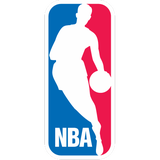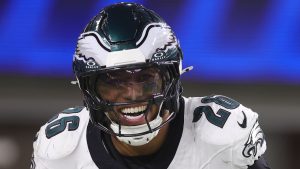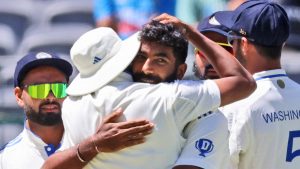A tough mental shift: EuroBasket star one week, NBA supporting role the next


By Ric Bucher
FOX Sports NBA Writer
EuroBasket has many upsides for NBA players who participate: It whips them into shape just ahead of NBA training camp; it tests them in the cauldron of high-stakes basketball rarely found outside the NBA playoffs; and it gives certain players a chance to star in a role that they might not always get in the world’s most-talented league.
Take Willy Hernangomez, his brother Juancho, Dennis Schroder and Evan Fournier as a few examples. Each member of that group could make the claim that, at least for the first couple of weeks in September, they outdid three NBA MVP candidates — Giannis Antetokounmpo, Luka Doncic and Nikola Jokic — by leading their teams to greater success at EuroBasket 2022.
Now they face the challenge of keeping that in perspective. How do you return to NBA training camp last week and to the less glorified “dirty work” of a floor spacer or decoy or defensive stopper?
Willy Hernangomez has to know intellectually that the New Orleans Pelicans don’t consider him on the same level as the team’s nucleus of Zion Williamson, Brandon Ingram and CJ McCollum. He’s in the second year of a modest three-year, $7.3 million contract. But can he play with the same energy and commitment in a complementary role after being the EuroBasket MVP? How will Schroder handle coming off the bench for the Lakers and potentially playing behind Russell Westbrook and Patrick Beverley after producing 30 points on 8-of-10 shooting and eight assists for Germany in a close semifinals loss to eventual champion Spain?
“You have to contextualize their performances,” a Western Conference GM said. “The Hernangomez brothers are the best players on Spain’s team, but they’re never going to be the best players on their NBA teams. Ever.”
Some foreign players can deal with that reality. Others can’t.
“Culturally, you’re going through a big adjustment,” the GM said. “Your role is being minimized, and the concern always is a player could say, ‘F— it, I can make a lot of money at home. Why am I f—ing with the NBA?’ Over the years, it’s been interesting to look at the guys who have had success and the other ones who have said, ‘F— it, I’m going back home.'”
Jonas Jerebko and Mario Hezonja are two international stars who scouts and executives believe never fully realized their NBA potential before heading back overseas. Hezonja, the fifth pick of the 2015 draft, played for three teams over a five-year span and is now back with Spain’s Real Madrid.
“Self-awareness for all players is critical,” the Western Conference GM said. “Hezonja, he never got it. As big of a talent as he was over there, he never could embrace what he needed to be in the NBA.”
Jerebko, despite being a second-round pick, made the All-Rookie team for the Detroit Pistons in 2010. But he never had the same featured role he enjoyed for Sweden’s national team and wound up with four different teams over nine seasons. Three years ago, he headed back to Europe and is now with CSKA Moscow.
“The guys that success overseas has screwed up in the past were bit players like Jonas Jerebko,” an Eastern Conference scout said. “He was the best player on his Swedish team, his team played pretty well, and then he came back to the Pistons, and he thought he was going to be ‘The Man’ because he was the best player on a bad team and played well.”
For some foreign players, their stellar performance in this year’s EuroBasket raised their profiles and could pay dividends in the NBA — if they can accept the right role. A free agent when the tournament began, Schroder signed with the Los Angeles Lakers after helping lead Germany to the bronze medal and making the all-tournament team. Tyler Dorsey, a 2018 second-round pick who signed a two-way contract with the Dallas Mavericks earlier this summer after several seasons playing overseas, convinced at least one GM that he could be more Maverick than (G League) Texas Legend by helping Greece reach the quarterfinals. The Washington Wizards‘ Deni Avdija impressed with his playmaking ability for Israel.
“The only other place you find that kind of pressure is in the NBA playoffs,” said an Eastern Conference GM who had a EuroBasket participant. “These are big games. I couldn’t be more thrilled for our guy to feel that, doing something he doesn’t get to do in the NBA. Now we see it, and say, ‘OK, let’s reassess and make sure he gets opportunities because he’s shown he can do it against high-level dudes.’ It’s a great opportunity for you to see your guy in a totally different light.”
But the lure of bigger opportunities overseas is always there. Just this summer, the Golden State Warriors wanted to bring Nemanja Bjelica back after he helped them win the championship, but he opted to join a Turkish Euroleague team, Fehnerbache, reportedly for similar money and a larger role.
Keep in mind: the Warriors lost him despite having the superstars to make a pecking order clear to all players. But plenty of teams — including the ones the Hernangomez brothers and Fournier play for — don’t have proven Hall of Fame centerpieces or a track record of title contention to make accepting a smaller role easier to swallow.
“So much has to do with the person and maturity level, understanding where your team is at,” the Western Conference GM said. “It’s harder for all players from overseas to accept a reduced role, especially on bad teams. The way most players look at it is, ‘Godd—-, man, you could lose with me playing a lot, too.'”
Fournier – in the second year of a four-year, $73 million deal with the New York Knicks, well beyond what he could make anywhere else – is getting paid more to do less for a team without championship hopes. He started all 80 games last year, but was the third option behind Julius Randle and RJ Barrett and league sources said coach Tom Thibodeau was adamant that young shooting guard Quentin Grimes not be included in the Knicks’ attempts to land Donovan Mitchell. But after a standout summer, how will Fournier handle Grimes potentially eating into his minutes and shots, especially if the Knicks are struggling? Given his contract, he’ll have to figure it out.
“He’s a focal point for France, but he’s not good enough in the NBA to be the focal point,” the Western Conference GM said. “He’s never going to be the first-, second- or third-best player on a really good team. Now when you’re not getting all those reps, all those opportunities, all those plays run for you, it’s a different game. That’s a skill set in itself, to be productive in a much more efficient manner with fewer opportunities, fewer touches.”
Perhaps the best guide for all these players is one of the most obvious: Manu Ginobili. He was a relative unknown when the San Antonio Spurs grabbed him with the second-to-last pick of the 1999 draft. Rather than signing right away, he remained in Italy to play for Kinder Bologna and won multiple league MVP awards and a Euroleague championship. He joined the Spurs after leading Argentina to a World Cup silver medal, playing a limited regular-season role but being a key contributor off the bench as the Spurs marched to the 2003 title. A year later, he led Argentina to an Olympic gold medal, the first non-USA team to win one in 16 years. The two years he was a full-time NBA starter he made the All-Star team, but for the better part of his career he happily came off the bench, sacrificing individual accolades to help the Spurs win four championship rings.
“Some guys never get it,” the Western Conference GM said. “And then there’s the guy who is actually better than his role but accepts his role because it’s in the best interests of winning. Like Ginobili.”
His sacrifice, a lesson to those who follow, ultimately paid off last month with the greatest individual accolade the sport can offer:
Induction in the Basketball Hall of Fame.
Ric Bucher is an NBA writer for FOX Sports. He previously wrote for Bleacher Report, ESPN The Magazine and The Washington Post and has written two books, “Rebound,” on NBA forward Brian Grant’s battle with young onset Parkinson’s, and “Yao: A Life In Two Worlds.” He also has a daily podcast, “On The Ball with Ric Bucher.” Follow him on Twitter @RicBucher.
Get more from National Basketball Association Follow your favorites to get information about games, news and more





